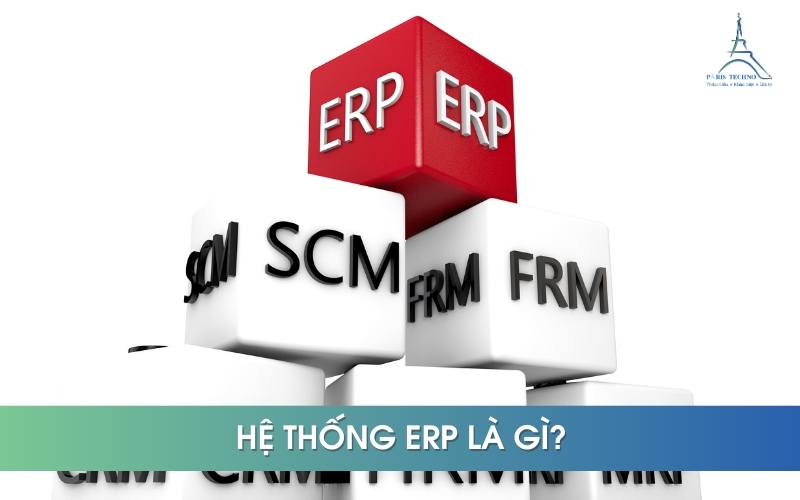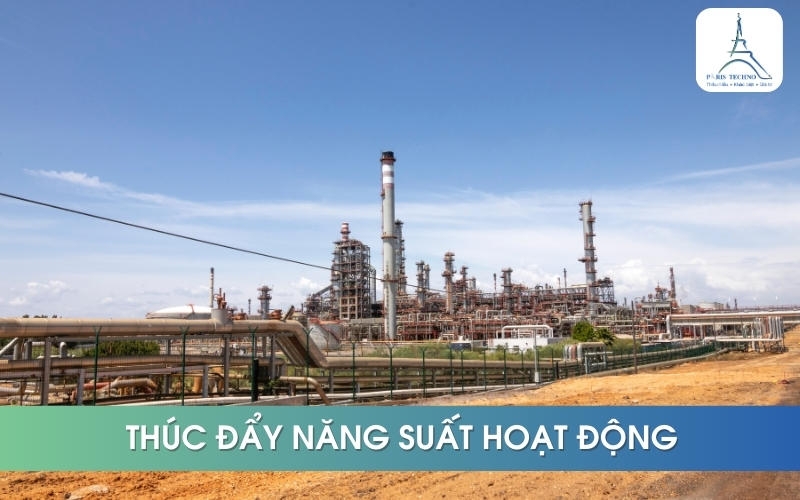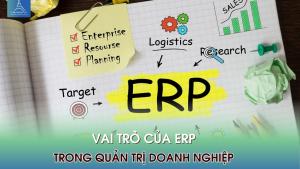The Role of ERP in business administration has become extremely important, especially in the current digital transformation period. Today's ERP systems are not simply management tools, but have developed with many outstanding features and functions, meeting the increasing needs of large enterprises. In this article, Paristechno will explore with you the ERP system and the outstanding benefits it can bring to your business!
What is ERP system?

The role of ERP is to integrate the business departments and processes of an enterprise into a single platform, helping to optimize management and operations. This system supports many areas, including accounting, finance, human resources, supply chain management, manufacturing, and additional features depending on the needs of each enterprise.
With the application of enterprise management systems, the role of ERP will help to gather and synchronize all information and data from different processes and departments. This helps the management have an overview of the information flow throughout the entire organization, ensuring that all processes are connected and operate smoothly from start to finish.
See also: What is ERP and Benefits of ERP in Business
The role of ERP in business
The power of ERP lies in its ability to connect and integrate all processes and departments in a business into a single platform. Thanks to this ability, the ERP system brings outstanding benefits, helping businesses operate more effectively and achieve sustainable development goals. The roles of ERP can be listed as:
The Role of ERP in Driving Business Performance

The role of ERP systems are essential to boosting business performance. With real-time updates and powerful forecasting capabilities, ERP systems provide a quick and accurate view of the business situation. By integrating data from different departments and processes, businesses can promptly detect weaknesses or suboptimal processes and make necessary adjustments.
Not only does it help reduce errors and optimize time, ERP also helps identify inefficient areas and provides data-driven solutions to improve productivity and performance across the entire organization. This not only helps businesses operate smoothly but also creates a solid foundation for achieving long-term goals and sustainable development.
The Role of ERP in Enhancing Decision Making and Action
When all business processes are integrated into a single system, ERP helps create a comprehensive picture of all business operations. With real-time information and close links between departments, management and employees can easily monitor and evaluate the performance of each department in the organization.
This not only helps reduce management ambiguity but also provides leaders with a clear vision of potential problems, opportunities to exploit, or areas for improvement. Thanks to the role of ERP, businesses can make faster and more accurate decisions, from adjusting business strategies to optimizing internal processes, helping the organization operate effectively and achieve its goals.
The Role of ERP in Ensuring Business Agility

The role of ERP in business management is not simply to support current operations but also to help businesses adapt flexibly to future changes and challenges. ERP systems are designed to grow and expand with the changing needs of the business, helping organizations remain competitive and resilient in an ever-changing business environment.
With its flexibility and process integration capabilities, ERP not only helps businesses manage their work effectively but also proactively prepares for sudden changes in the market, new customer requirements, or external environmental factors. Thanks to its ability to adjust and update quickly, ERP allows businesses to always be ready to respond to changing situations, helping to maintain stability and sustainable development.
Subsystems integrated in ERP management system
ERP business management system consists of many subsystems, these subsystems are built according to the needs of the business. Some of the main indispensable subsystems of ERP in the business can be listed as follows:
Accounting and finance subsystem
Considered the most important subsystem of the ERP system in an enterprise, this subsystem provides an overview of the financial situation of the enterprise, thereby supporting more accurate management decisions and business strategies.
In addition to basic features, some ERP systems also provide advanced features such as tax management, fixed asset management, and multi-currency reconciliation capabilities, making it easier for businesses to manage complex and diverse financial issues in a global business environment.
Human resource management subsystem

The human resource management subsystem in the ERP system helps optimize and minimize manual tasks such as recruitment, employee management, performance evaluation and salary calculation.
In addition, this subsystem also plays an important role in centralizing and managing all employee records, salary and benefits information, as well as other important data such as working hours, leave and other administrative information, helping to ensure accuracy and transparency in human resource management.
Management reporting subsystem
The management reporting subsystem in ERP provides managers with an overview of the business's operations. These reports help leaders make timely and accurate decisions, thanks to the collection and updating of real-time data, ensuring that information is always accurate and relevant to the current operating situation.
Inventory management subsystem
The inventory management module in ERP provides features such as tracking inventory quantities, planning and controlling inventory levels, along with automating warehouse management processes. This helps optimize inventory control, minimize errors, and ensure that supplies always meet the production and business needs of the enterprise.
Project and work management subsystem

Thanks to the management system and the role of ERP, the company's personnel can work more effectively with features such as monitoring work progress, distributing resources properly, and automating work and project management processes. These features not only help increase labor productivity but also ensure that work is done on time and meets the required quality.
Sales management subsystem
The sales management subsystem helps businesses control all sales activities, from managing sales channels and sales staff, to tracking orders and creating quotes. This feature helps optimize the sales process, improve efficiency and ensure fast and accurate service delivery to customers.
Production and logistics management subsystem
The role of ERP in business management includes the ability to plan production, manage manufacturing needs and the business's logistics partners.
In addition, ERP also supports in ensuring product quality, planning distribution and tracking delivery processes, helping businesses control the entire supply chain and order fulfillment process efficiently and accurately.
Customer Relationship Management (CRM)

The CRM subsystem within an ERP system helps collect, aggregate, and analyze information about customers and prospects, including contact details, purchase history, and service records, all stored in a unified data platform.
This data can be used to improve customer engagement, build and maintain long-term relationships. The CRM module also integrates with other ERP modules, such as financial management, accounting, orders and marketing, to optimize business operations in a synchronized and efficient manner.
In short, in a business, the role of ERP in administrative activities is very clear. From internal human resource management to supply chain management or external customer files. It can be said that ERP is becoming an indispensable trend for businesses and organizations at the present time.
ERPcons - Construction Project Management Software
Website: https://erpcons.vn
LinkedIn: ERPcons
Hotline: 0814.22.8888

